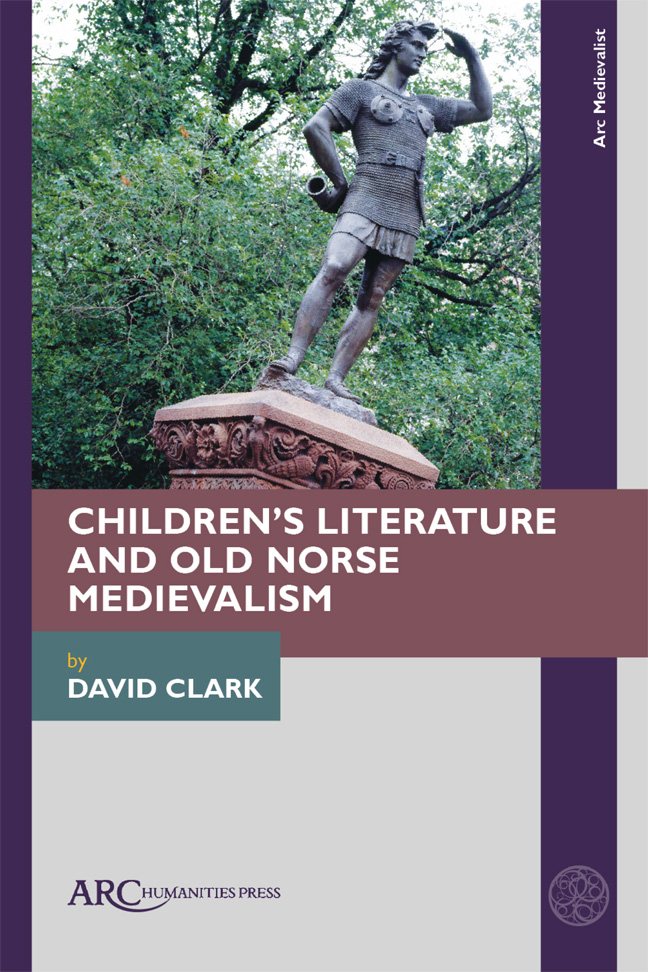Book contents
- Frontmatter
- Contents
- Acknowledgements
- Dedication
- Introduction: The End
- 1 Age-Related Categories
- 2 Generic Categories
- 3 Transformational Fantasy
- 4 Horned Helmets and Comic Anachronism
- 5 Viking Reputation
- 6 Runes and Magic
- 7 The Power of Story
- 8 Race and Ethnicity
- 9 Heroism
- 10 Viking Masculinity
- 11 Viking Femininity
- 12 Viking Sex and Gender
- 13 Bowdlerization
- 14 Sexuality
- 15 Ecological Threat
- 16 Norse Medievalism in Alan Early's Father of Lies Trilogy
- 17 Avoiding the End of Days: K. L. Armstrong and M. A. Marr's Blackwell Pages
- 18 Rick Riordan's Magnus Chase Series and Norse Medievalism
- Conclusion
- Select Bibliography of Frequently Cited Works
- Index
Conclusion
Published online by Cambridge University Press: 17 February 2024
- Frontmatter
- Contents
- Acknowledgements
- Dedication
- Introduction: The End
- 1 Age-Related Categories
- 2 Generic Categories
- 3 Transformational Fantasy
- 4 Horned Helmets and Comic Anachronism
- 5 Viking Reputation
- 6 Runes and Magic
- 7 The Power of Story
- 8 Race and Ethnicity
- 9 Heroism
- 10 Viking Masculinity
- 11 Viking Femininity
- 12 Viking Sex and Gender
- 13 Bowdlerization
- 14 Sexuality
- 15 Ecological Threat
- 16 Norse Medievalism in Alan Early's Father of Lies Trilogy
- 17 Avoiding the End of Days: K. L. Armstrong and M. A. Marr's Blackwell Pages
- 18 Rick Riordan's Magnus Chase Series and Norse Medievalism
- Conclusion
- Select Bibliography of Frequently Cited Works
- Index
Summary
AS THE FOREGOING chapters evince, in the hundreds of Norse medievalist chil-dren's books published in the first two decades of the twentyfirst century a number of motifs and themes predominate, but they are treated in no single consistent way.
The Vikings are obviously a key element of this material, but they feature as alter-nately farmers, raiders, and explorers; they may be invested in revenge, reputation, and honour, but also in forming communities and learning from other cultures. Violence and aggression may be celebrated or opposed by characters, according to the individual author's values.
Old Norse culture tends to be represented by elements such as runes and/or magic (which may be accepted or explained away as trickery); versions or retellings of the sagas, eddas, skaldic verse, and folklore; by horned helmets or skull-goblets (though these are increasingly explicitly discussed as anachronisms or myths); by trolls, berserk-ers, and longships; by níð and a shame/honour system; and, though mainly viewed from inside the culture, Norse is sometimes also viewed from the perspective of outsiders like the early English, or the Arabic explorer Ibn Fadlan.
In terms of Old Norse mythology itself, the Old Norse gods feature most often in asso-ciation with a particular trait—such as Odin's one eye and obsessive search for knowl-edge; Thor's hammer and his contests against the giants; Loki's trickster nature—and as mediating or inciting characters. They are often accompanied by the Norns, valkyries, Fenrir, and the World Serpent, and, in relation to Ragnarok, now frequently seen in ecological terms. The most commonly used sources are Snorri's Prose Edda and eddic poems such as Voluspa, Havamal, and Skirnir's Journey (the latter usually bowdlerized).
Issues of identity are prominent, too. The most dominant ones involve cultural or personal difference (and its acceptance); belonging and families (of birth and, more recently, of choice); gender identity (whether accepting or subverting stereotypes of masculinity and femininity); religious diversity (and often syncretism); race and ethnic groups ranging from the Norse and early English to the Rus, Sami, Native Americans and others (though it is still rare to see black representation).
- Type
- Chapter
- Information
- Children's Literature and Old Norse Medievalism , pp. 185 - 188Publisher: Amsterdam University PressPrint publication year: 2023



